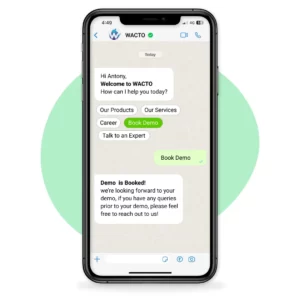
In recent years, Artificial Intelligence (AI) has rapidly advanced across various sectors, including healthcare in India being one of the most promising and impactful ones. As the nation grapples with the challenges of providing quality healthcare to its vast population, AI is emerging as a powerful ally, redefining the way healthcare is delivered, managed, and experienced.
Table of Content
The Role of Chatbots in Healthcare
Chatbots, powered by AI, are revolutionizing patient interaction and care. These conversational agents are designed to simulate human-like conversations, offering immediate responses and assistance to patients. In India, where access to healthcare can be limited in rural areas, chatbots serve as the first point of contact, providing information on symptoms, treatments, and preventive care.
Chatbots are particularly useful in managing routine inquiries, appointment bookings, and providing reminders for medication or follow-up visits. This not only enhances patient engagement but also frees up healthcare professionals to focus on more complex cases. For example, chatbots can manage a high volume of inquiries at once, ensuring patients receive timely information without overburdening healthcare staff.
Conversational AI in Diagnostics and Patient Care
Conversational AI goes beyond simple chatbots, offering more sophisticated interactions and decision-making capabilities. In the context of healthcare, conversational AI can assist doctors in diagnosing conditions by analyzing patient data, symptoms, and medical history. This technology can suggest potential diagnoses, recommend tests, and even propose treatment plans based on the latest medical research.
Moreover, conversational AI can monitor patients remotely, offering real-time insights into their health status. This is especially advantageous for managing chronic diseases, where ongoing monitoring and timely interventions are essential. Patients with conditions like diabetes or hypertension can benefit from AI-driven systems that track their health metrics and provide personalized advice to manage their condition effectively.
Enhancing Conversational Engagement in Healthcare
AI-powered conversational engagement is revolutionizing the way patients communicate with healthcare providers. With the integration of AI in platforms like WhatsApp Business API, healthcare providers can maintain continuous communication with patients, offering support and information through a familiar and accessible medium.
For example, healthcare providers can use WhatsApp to send personalized health tips, appointment reminders, or even conduct virtual consultations. The conversational nature of these interactions helps in building trust and ensuring that patients feel cared for, even outside the traditional healthcare settings.
The Impact of AI on Healthcare Accessibility
One of the significant challenges in India’s healthcare system is accessibility, particularly in rural and underserved areas. AI is essential in bridging healthcare gaps by facilitating remote consultations, diagnostics, and even treatment through telemedicine platforms. Patients can now consult with specialists and receive quality healthcare services in a click from the comfort of their homes, eliminating the need to travel long distances.
AI-powered platforms can also analyze large datasets to identify healthcare trends and needs in specific regions, allowing for better resource allocation and targeted interventions. This data-driven approach ensures that healthcare services reach the populations that need them the most.
AI in Personalized Healthcare
Patient personalization is a key trend in modern healthcare, and AI is at the forefront of this movement. AI algorithms can analyze patient data to develop personalized treatment plans and streamline appointment scheduling through automation. This level of customization ensures that patients receive care that is tailored to their specific needs, leading to better outcomes.
In addition, AI can predict potential health risks based on a patient’s data, allowing for proactive measures to prevent the onset of diseases. For example, AI can analyze a patient’s genetic predisposition to certain conditions and recommend lifestyle changes or preventive treatments to mitigate these risks.
Challenges and the Future of AI-Chatbots in Indian Healthcare Sector
While AI-chatbots hold immense potential in transforming Indian healthcare, several challenges need to be addressed. Protecting data privacy and security is crucial since AI systems depend on vast amounts of sensitive patient information. Ensuring that this data is protected and used ethically is critical to gaining public trust.
Moreover, the integration of AI into healthcare requires significant investment in infrastructure, training, and awareness. Healthcare professionals need to be trained to work alongside AI tools, understanding their capabilities and limitations.
Looking ahead, the future of AI in Indian healthcare is promising. As technology continues to evolve, we can expect AI to play an even more significant role in areas such as predictive analytics, personalized medicine, and healthcare management. The ultimate goal is to create a healthcare ecosystem where AI acts as a reliable partner, enhancing the quality of care and making healthcare more accessible and efficient for all.
Conclusion
AI is poised to become the new caregiver in India’s healthcare landscape. AI is transforming healthcare by integrating chatbots, conversational AI chatbot, personalized medicine, and remote monitoring, fundamentally changing how care is delivered. As India continues to embrace digital transformation, AI will play a crucial role in ensuring that healthcare services are efficient, accessible, and patient-centric.
For healthcare providers, adopting AI technologies is no longer optional but necessary to stay competitive and meet the evolving needs of patients. As AI continues to advance, the possibilities for improving healthcare in India are limitless, making it an exciting time for both patients and providers.
